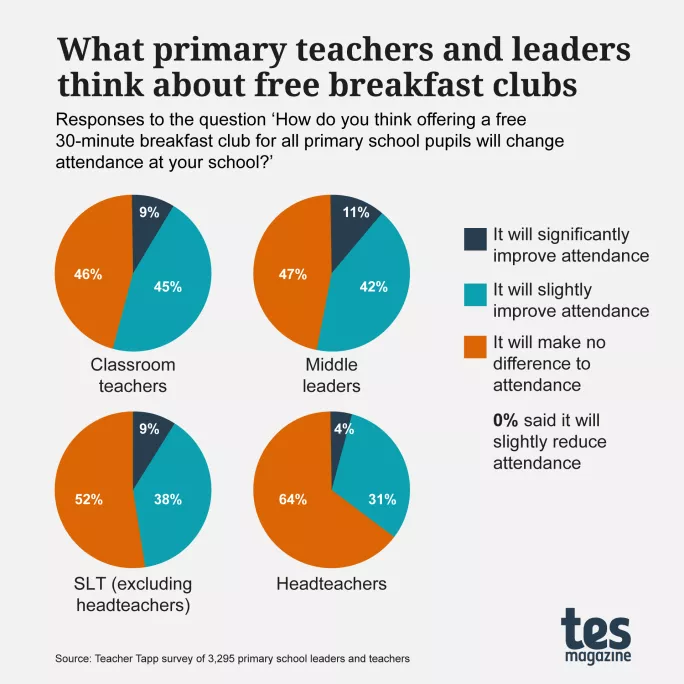Breakfast clubs wonŌĆÖt improve attendance, say most heads

Nearly two-thirds of primary school headteachers believe the governmentŌĆÖs free breakfast clubs scheme will have no impact on attendance.
Poll findings, shared with Tes, come after Labour launched a pilot scheme for free breakfast clubs in primary schools, which it says ŌĆ£could cut almost half a million days of school absenceŌĆØ if rolled out nationally.
Some 64 per cent of primary school headteachers, surveyed by Teacher Tapp, said a free 30-minute breakfast club for primary school pupils will make no difference to attendance.
Just over half of senior leaders in primary schools, excluding heads, said the same, along with 47 per cent of middle leaders and 46 per cent of teachers.
However, 43 per cent of all respondents to the survey, which involved 3,000 primary school leaders and teachers, said the clubs will result in a ŌĆ£slight improvementŌĆØ in attendance, with 9 per cent believing the impact will be significant.

╠²
The results of the survey have been published after Department for Education data showed that the rate of unauthorised absence for primary school pupils remained unchanged last term compared with the autumn term in 2023-24.
Breakfast clubs ŌĆśtackle punctuality not attendanceŌĆÖ
The government issued guidance last week on how it expects the 750 schools that signed up to the early adopter breakfast clubs programme to implement the scheme when it begins in the summer.
While many leaders seem to doubt that the new breakfast clubs will improve attendance, some believe it could reduce lateness.
- DfE guidance: What schools need to know about breakfast clubs
- School attendance data: Slight drop in pupil absence
- Breakfast clubs: Ministers urged not to repeat mistakes of NTP
ŌĆ£I absolutely agree that breakfast clubs wonŌĆÖt improve attendance: punctuality, yes, but attendance, no,ŌĆØ said Nick Osborne, chief executive of the Maritime Academy Trust, which has 13 primary schools.
Mr Osborne questioned who the policy was for, saying that ŌĆ£a free slice of toast and a few games before schoolŌĆØ are not going to entice pupils who do not want to go into school. The schemeŌĆÖs main benefit is ŌĆ£childcare for working parentsŌĆØ, he added.
Paul Whiteman, general secretary of the NAHT school leadersŌĆÖ union, said that ŌĆØwhere schools are struggling to get some pupils into school, the offer of a breakfast club may not be the thing that changes thatŌĆØ.
He called for greater investment in social care and childrenŌĆÖs mental health services, and for action against tackle child poverty.
Tiffnie Harris, primary specialist at the Association of School and College Leaders, said: ŌĆ£Breakfast clubs may help to boost attendance to some extent but they may not have a massive impact.ŌĆØ
She said the clubs will not ŌĆ£get to grips with those deeper-rooted problems which often need expert helpŌĆØ.
Ms Harris added that rolling out breakfast provision will be a ŌĆ£real challengeŌĆØ for smaller primary schools with fewer staff.
Disadvantaged schools more optimistic
TeachersŌĆÖ and school leadersŌĆÖ responses to the survey differed according to the location of their schools.
Teachers working in more deprived areas were more likely to believe that breakfast clubs will improve attendance than those working in more affluent areas (52 per cent compared with 35 per cent).
The survey measured deprivation according to the number of pupils on free school meals.
Those working in schools judged ŌĆ£requires improvementŌĆØ or ŌĆ£inadequateŌĆØ were also more likely to say that the clubs will have a slightly positive impact on attendance (46 per cent compared with 43 per cent for ŌĆ£outstandingŌĆØ schools).
Dan Morrow, chief executive of Cornwall Education Learning Trust, which has 16 schools, said the clubs will help to ensure that schools are a ŌĆ£safety netŌĆØ.
ŌĆ£It is an important step forward as it is optional and provides greater flexibility for parents and carers, as well as ensuring that we have equity in how the day starts,ŌĆØ he said.
The policy will have ŌĆ£positive impactsŌĆØ on attendance, he added, but ŌĆ£more crucially it reinforces the socioeconomic safety net that schools must coordinate and holdŌĆØ.
Education minister Stephen Morgan previously said that breakfast clubs will be a ŌĆ£key contributorŌĆØ to the Department for EducationŌĆÖs mission to break down barriers to opportunity.
A Department for Education spokesperson said: ŌĆ£Through our Plan for Change, we are taking action to break the unfair link between background and success, supported by our plan to roll out free breakfast clubs in every primary school.
ŌĆ£ThatŌĆÖs why we are tripling our investment to over ┬Ż30 million, with free breakfast clubs to begin in up to 750 schools from as early as April 2025.ŌĆØ
For the latest education news and analysis delivered every weekday morning, sign up for the Tes Daily newsletter
Register with Tes and you can read two free articles every month plus you'll have access to our range of award-winning newsletters.
Keep reading with our special offer!
YouŌĆÖve reached your limit of free articles this month.
- Unlimited access to all Tes magazine content
- Save your favourite articles and gift them to your colleagues
- Exclusive subscriber-only stories
- Over 200,000 archived articles
- Unlimited access to all Tes magazine content
- Save your favourite articles and gift them to your colleagues
- Exclusive subscriber-only stories
- Over 200,000 archived articles
topics in this article



